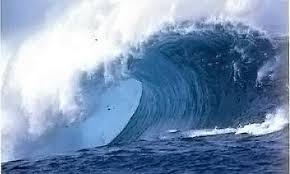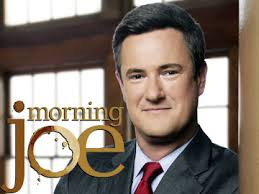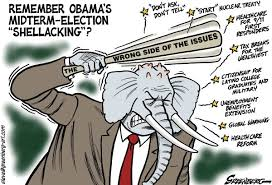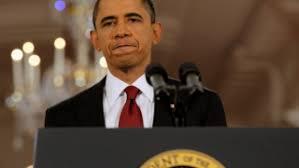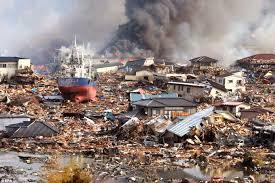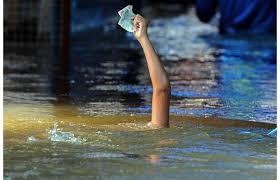The night after the 2010 midterm election The Daily Show's Jon Stewart played a montage of metaphors used by pundits to describe the extent of the GOP's victory; among the most popular were "tidal wave," "tsunami," and "earthquake."
Four years later, the battle of the midterm metaphor continues.
The award for the most extensive use of the maritime metaphor goes to The Crystal Ball's Larry Sabato whose chart showing a wide-range of potential outcomes in the Senate includes: calm seas, ripples, small breakers, sea wall holds, sea wall breached, gale force white caps, tropical storm wave, tidal wave, and tsunami.
In explaining his use of "mariner's terminology" Sabato writes: "Democrats hope for no wave at all: Something akin to 'beach week,'... More realistically, Democrats can hope for fearsome-sounding waves that crash loudly but do little structural damage. Republicans, on the other hand, are rooting for an impressive tidal wave, if not a full-fledged historic tsunami."
Sabato may have taken the mariner's metaphor to new heights, but he is not alone.
Just the other day on MSNBC's Morning Joe, host Joe Scarborough spoke about "crosscurrents," while his guest, columnist Al Hunt, referenced a "mini-tide."
A few days later, several of the guests on Fox News Sundays' panel, as well as the host, referred to a "wave" election. Writing in USA Today,Ross Baker took exception to some of the early election "forecasts" noting that far from a "tsunami" the election for Senate is "more likely to be a flooded basement". Baker went on to catalog a litany of what he refers to as "oceanographic" metaphors being used this season, among them Stuart Rothenberg's prediction of a "substantial Republican Senate wave" and Sam Wang's suggestion that a "wave" is possible, but it is more likely to be "a ripple". To this we can add Lauren Ewing's suggestion that there are "few signs of a tsunami" this year and
Rothenberg, Wang, Ewing and Trende are just a few of the many analysts who seem to favor marine metaphors. They owe their allegiance to the 'father' of the midterm election wave metaphor, James Campbell, who first used it in 1994 to help explain unexpected GOP gains. But maritime metaphors are just the tip of the iceberg, we also see geological and meteorological references as well. Writing in the American Spectator, for instance, Jeffrey Lord adopted both the marine and meteorological when he asked whether we should expect a "wave" or an "earthquake"? Paul Gronke and Phillip Ardoin opted for the climate metaphor when in the Washington Post's 'Monkey Cage' they recently predicted that "sunny days are ahead for the GOP".
Pundits rely on metaphors because in a market saturated with analysts analyzing and prognosticators prognosticating talk of an impending tsunami or earthquake can help break through the din.
They also use metaphors for the same reason so many of us rely on them, they help convey complex information that is otherwise difficult to explain. To quote Aristotle, "[o]rdinary words portray only what we know already; it is from metaphor that we can best get hold of something fresh."
What is more fascinating than why we use them, however, is what the metaphors we choose say about our electoral politics today.
Whether maritime, meteorological, or geological, what all these midterm metaphors have in common is two-fold. First, many convey images of violence and impending destruction - crashing waves storms, tsunamis, and earthquakes. Stewart made note of this when following 2010 he said, not completely facetiously, "You do realize that all your metaphors for Republican victory killed thousands of people."
And it isn't only pundits who are prone to violent, destructive metaphors when discussing midterm elections. President Obama described what happened to Democrats during the 2010 election as a "shellacking". This caused some raised eyebrows not only because the term is uncommon, but because it has violent connotations (i.e., to beat up, whip, rout or trounce). Obama wasn't the first president to use a brutal term to describe what happened to his party in a midterm. In 2006, President George W. Bush used the term "thumpin'" to describe GOP losses that year. As Rob Kyff notes, to thump is "to strike or beat with something heavy" or to "beat someone soundly."
In addition to their violent undertones, many of the most common midterm metaphors used in the modern era refer to natural episodes, most commonly natural disasters: tidal waves, tsunami's, earthquakes, gale force winds, tropical storms, etc. In short, it has become common to describe our midterm elections not only as violent episodes, but natural and often deadly occurrences over which we have limited control, if any.
The notion that we see our electoral politics as akin to the 2004 Indonesian tsunami or the Great Sichuan Earthquake that struck China in 2008, or any of the countless other natural disasters which have killed millions without warning is telling. And what it suggests about who we are politically is of far greater concern than which party narrowly captures the Senate in November.

